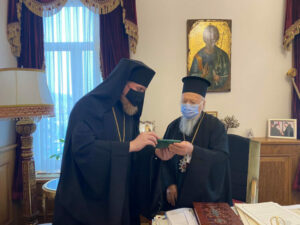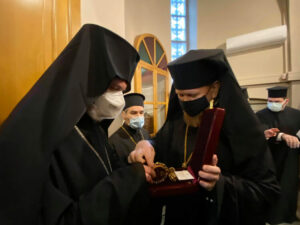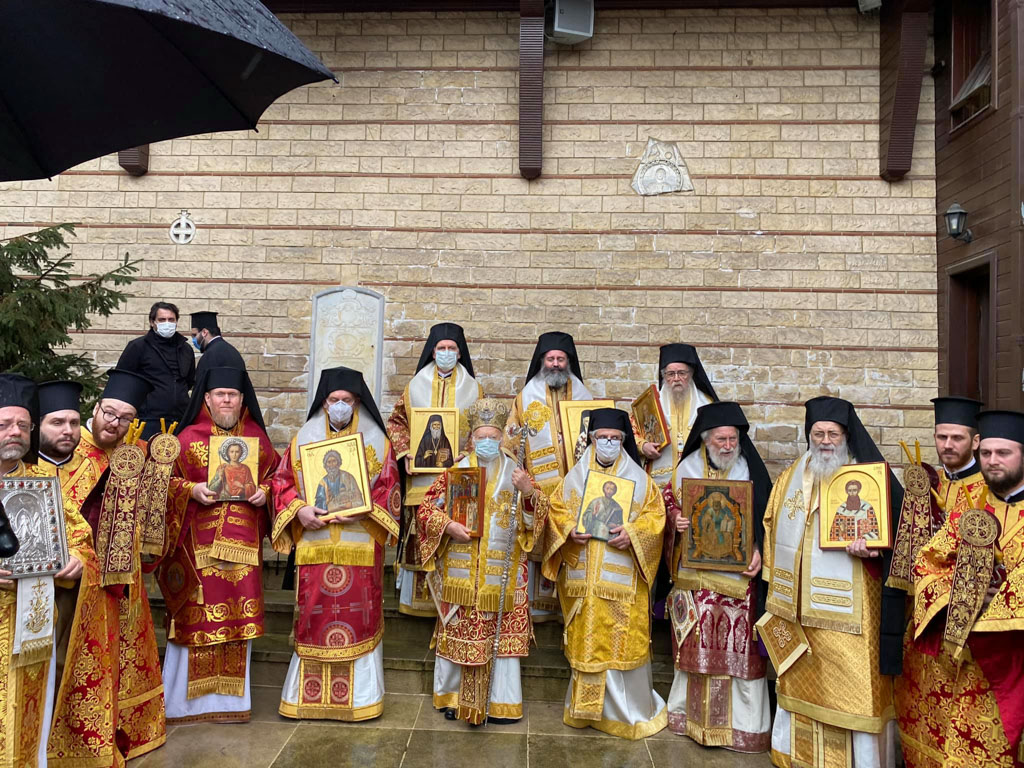OrthodoxTimes met the Archbishop of Chernihiv and Nizhyn, Evstratiy (Zoria), to ask him, among other things, about the forthcoming visit of Ecumenical Patriarch Bartholomew to Ukraine and why the Moscow Patriarchate reacts so strongly to it.
The hierarch of the Orthodox Church of Ukraine also referred to the “difficult situation in which Patriarch Theophilos of Jerusalem found himself” and argued that the initiative for the so-called “Amman meeting” was not actually his idea.
He spoke about the obstacles raised by the Moscow Patriarchate in the process of “transitions” of the parishes to the Church of Ukraine and other important issues, while also revealing the real statistics of Ukrainians’ support for the Church.
Interview with Kostas Onisenko
Good morning. Recently you had a meeting with Ecumenical Patriarch Bartholomew in the Phanar. What was the purpose of the meeting?
Of course, we discussed his forthcoming visit to Ukraine. We look forward to seeing him on August 24, which marks the 30th anniversary of the independence of the Ukrainian State. Pandemic seems to be an unpredictable factor but all other conditions are favorable. There is the desire of the Orthodox Church of Ukraine and the will of the Ukrainian State. Ukrainian President Volodymyr Zelensky is also waiting for the Patriarch.
It seems that not everyone is waiting for the Ecumenical Patriarch with the same anticipation. What is the reason for the strong reactions of the Moscow Patriarchate for the upcoming visit?
 In recent decades, based upon the narrative of the Moscow Patriarchate in Ukraine, it has claimed to be the only canonical Church. In order to prove their claim, they cited the fact that the other Churches communicated only with them. Now this argument will work against them. When everyone sees for themselves that the Ecumenical Patriarch concelebrates with Metropolitan Epifaniy of Kyiv.
In recent decades, based upon the narrative of the Moscow Patriarchate in Ukraine, it has claimed to be the only canonical Church. In order to prove their claim, they cited the fact that the other Churches communicated only with them. Now this argument will work against them. When everyone sees for themselves that the Ecumenical Patriarch concelebrates with Metropolitan Epifaniy of Kyiv.
The Russian Orthodox Church fears that in the mind of many parishioners and priests, who still belong to the Moscow Patriarchate, the view that the Church to which they belong is illegal under church canons and the belief that their situation is doubtful about the future will grow stronger. For this,
they fear that the tendency to leave the jurisdiction of the Russian Orthodox Church in Ukraine will intensify.
Another reason is the pressure on the Ecumenical Patriarch himself. Relying on the fact that this is a great Church, behind which there is a great state with political, economic and another potential, they essentially want to take the first place in Orthodoxy. However, as this position, according to sacred canons and based upon history, is already occupied, they try to oust the Ecumenical Patriarch from his position. It is a concept that has existed in the Moscow Patriarchate since the end of the Second World War.
There are USSR state and church documents that demonstrate that as early as 1947-48 (as they considered the circumstances to be favorable for them) there was an intention to hold the “8th Ecumenical Council” in Moscow and to grant the title of Ecumenical Patriarch to the Patriarch of Moscow. The plan was not achieved but the concept remained.
Still, they are trying, with the noise created in the Media, to influence the decisions of the local Churches that have not yet taken a position regarding the Autocephaly Tomos of the Orthodox Church of Ukraine.
Of course, another factor is that these moves are part of the hybrid aggression (editor’s note: of Russia) against Ukraine. Openly pro-Russian arguments are not popular in Ukraine, but one can promote Russian arguments under the pretext of defending the freedom of expression, protesting against violations of one’s rights, etc.
Do you think that there is a possibility that we will be incidents and provocations in Ukraine in view of Bartholomew’s visit?
If, under the law, they (the Russian Orthodox Church) consider it necessary to express their opposition to anything, they will do so, as they have done all these years anyway. For the rest, the Ukrainian State has all the legal instruments, security and intelligence services to prevent any attempts from outside or inside to use the religious issue for the purposes of Russian hybrid aggression. It has the instruments to deal with any provocations or violence.
As you mentioned the Ukrainian State, what is the relationship of the Orthodox Church of Ukraine with the government? Unlike Poroshenko, current government officials have stated they do not want to get involved in church matters.
There is a difference between theory and practice. Neither Poroshenko supported the idea of an Autocephalous Ukrainian Church 20 years ago, nor did Yanukovych, who was clearly a pro-Russian president, dare to go ahead with the full subordination of all Ukrainian Orthodox to Moscow when he was proposed to do so.
Before coming to power, the current government officials had certain views on Church-State relations and, like any opposition group, tried to show a different approach from the then government. However, coming to power, they realized in practice that religion, the operation of church-religious organizations is not a restricted issue that deals only with the grandmother lighting a candle in the church. It’s a huge set of issues. And religious organizations are an integral part of society.
We are satisfied with the current attitude of the government regarding the foreign affairs of the Church as it is in line with the legislation. As far as our internal affairs are concerned, no intervention or pressure from the authorities have been exerted on us.
There is a perception that the process of transfer of parishes from the Russian (in Ukraine) Church to the Orthodox Church of Ukraine is stuck. What do you know about this?
The Russian Orthodox Church raises a number of obstacles in all parishes that recognize the Tomos, at all stages of the process, from the announcement of parish assemblies to the moment that court decisions have been issued. They use pressure on public officials and priests, threats, bribery, communication war. They are trying to make noise in the media so as not to intimidate those who want to join the Church of Ukraine.
However, albeit somewhat belatedly, the process is progressing apace with one or two parishes decide to come to us every month. Initially, when the Autocephaly Tomos was given, there was a first big wave of recognitions, about 700 parishes. At the moment, in my opinion, a new wave of parishes is gathering that are ready to recognize the Tomos of Autocephaly. And this process follows soon.
What is “statistics”?
It is often argued that the Russian Orthodox Church in Ukraine is more influential than the Orthodox Church of Ukraine. However, this does not reflect reality based on sociological studies. To understand this one must first understand how these numbers are produced.
A registered religious organization (such as a parish, a monastery, a seminary, etc.) can be established as a legal entity in Ukraine by ten individuals, either nationals or non-nationals, legally residing in the country.
There are many religious organizations that are formally established but do not actually operate or have very few parishioners. The Orthodox Church of Ukraine has about 7,000 registered legal entities. The Moscow Patriarchate in Ukraine has about 11,000 registered legal entities. Based on this statistic, the Moscow Patriarchate appears to have a greater impact.
However, these statistics do not reflect real support because, according to independent sociological research, about 25% of Ukrainians associate themselves with the Orthodox Church of Ukraine. About 15% associate themselves with the Moscow Patriarchate.
The remaining 30% call themselves “purely Orthodox,” mainly in the south and east of the country. In total, about 70% of the population view themselves as Orthodox.
What is your view on the process that took place in Amman?
This is a fruitless idea. What is the purpose of this meeting? So that the Ecumenical Patriarch renounces the Tomos of Autocephaly? He will never do.
To demonstrate their strength to the Ecumenical Patriarch? To show that there were more from our side gathered than from your side? The gathering in Amman showed just the opposite. What is the purpose?
To resolve the issue of coexistence with the Russian Orthodox Church while the Tomos of Autocephaly exists? What will happen to the Russian dioceses, bishops, parishes, etc.?
How can this be done without the participation of the Orthodox Church of Ukraine? With whom does the Russian Orthodox Church want to solve this issue? With herself? In this case, why did they have to go to Amman and use the Patriarchate of Jerusalem as a mediator?
If there is a problem of relations between two Churches, then dialogue must take place between these two Churches. If they consider it necessary for someone else to participate, they have to say so.
In fact, if we are talking about a pan-Orthodox level, then the church canons and the tradition of the past and the present indicate that only the Ecumenical Patriarch has the right to take such an initiative, that is, to conduct and preside over such a Synod.
Moreover, only the Synod where the Orthodox Church of Ukraine will be equally present has the right to exist. The equal participation of the Orthodox Church of Ukraine in all Orthodox meetings is not its right or privilege, but, as it is written in the Tomos, it is its obligation. The Orthodox Church of Ukraine will always defend this obligation.
Why is the Patriarch of Jerusalem involved in this?
By taking such initiatives, Moscow is taking advantage of the fact that Russian influence is quite strong in the wider region. But that’s the way to promote the truth? By intimidating the others? By bribing? By exerting pressure? By lying?
We see that Moscow has so far taken action in those local Churches that have recognized the autocephaly of the Orthodox Church of Ukraine; it is trying to sow discord in each of these Churches. We see this situation in Greece, at the Patriarchate of Alexandria, in Cyprus.
Obviously, something like this had been the case in relation to the Patriarchate of Jerusalem. If Patriarch Theophilos declared tomorrow that he had added the name of Metropolitan Epifaniy in the diptychs and had recognized the Tomos of Autocephaly, some Metropolitans would immediately express in public their disagreement.
We even know the names of these Metropolitans, those who received their educated in Russia, those who constantly refer to Russian positions. Certain people have not only spiritual relations with Russia but also all kinds of support from it.
Given the fact that the situation within the Patriarchate of Jerusalem itself is balancing between different centers of influence and sides, it is obvious that no one wants to try their luck and hold a “bomb” that can explode with unforeseen consequences. Moscow is taking advantage of it.
That is why our Church and I understand the very difficult position of the Patriarch of Jerusalem, who supposedly took the initiative for this meeting. Both he and the others know that the initiative was not his.
What were your thoughts when you learned that Metropolitan Emmanuel had been ordained Elder Metropolitan of Chalcedon, a man and hierarch who stood by the side of the newly established Church of Ukraine from the first day?
 First of all, it is obvious that the Ecumenical Patriarch appointed the Metropolitan Emmanuel as the responsible to deal with the Ukrainian issues, in particular with issues of the Autocephaly Tomos, thanks to the Metropolitan’s previous experience in resolving issues appointed by the Ecumenical Patriarch. We did not learn in 2018 that Emmanuel is one of the key church diplomats for the Ecumenical Patriarch. It is obvious that, as a person who is directly connected with this process, he knows best, both profoundly and qualitatively, the particularities of the Ukrainian religious issue.
First of all, it is obvious that the Ecumenical Patriarch appointed the Metropolitan Emmanuel as the responsible to deal with the Ukrainian issues, in particular with issues of the Autocephaly Tomos, thanks to the Metropolitan’s previous experience in resolving issues appointed by the Ecumenical Patriarch. We did not learn in 2018 that Emmanuel is one of the key church diplomats for the Ecumenical Patriarch. It is obvious that, as a person who is directly connected with this process, he knows best, both profoundly and qualitatively, the particularities of the Ukrainian religious issue.
On the other hand, like any decision, it can have an opponent. One can use the Ukrainian issue to oppose. But I think that the experience of the Ecumenical Patriarch and the experience of Metropolitan Emmanuel himself, as well as the experience of many of those who work in the Patriarchate, and the hierarchy of the Patriarchate alone are sufficient to overcome some subjective points, understanding the responsibility, both historical and canonical, of the Ecumenical Patriarchate who have to deal with the past, present and future of all Orthodoxy, not just the Orthodoxy in Ukraine or the Ecumenical Patriarchate.
















